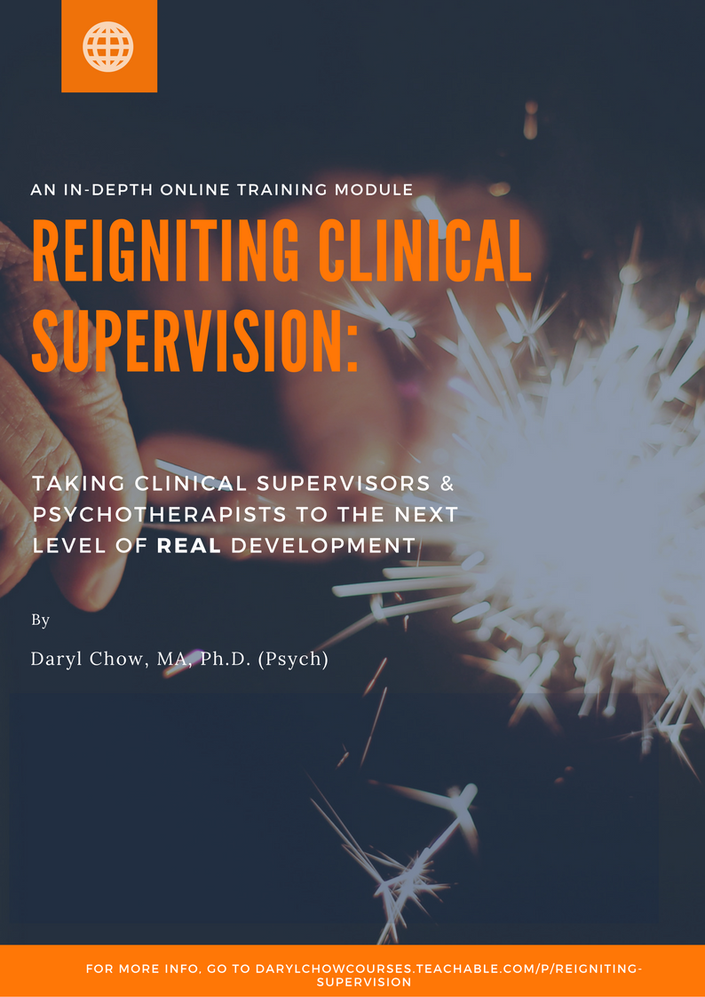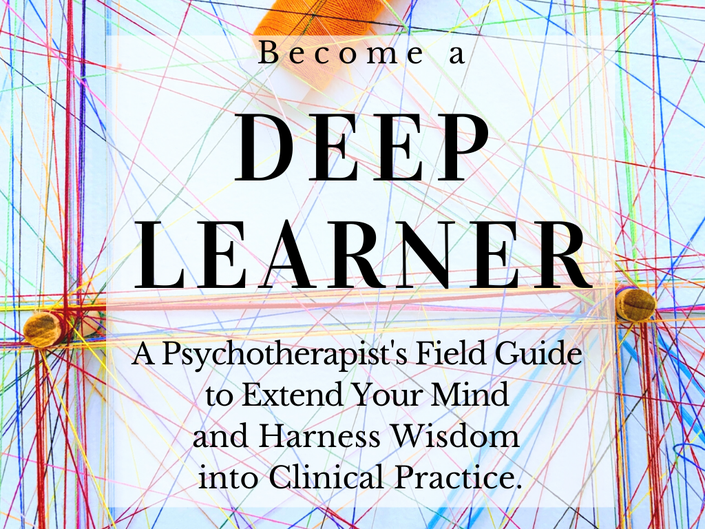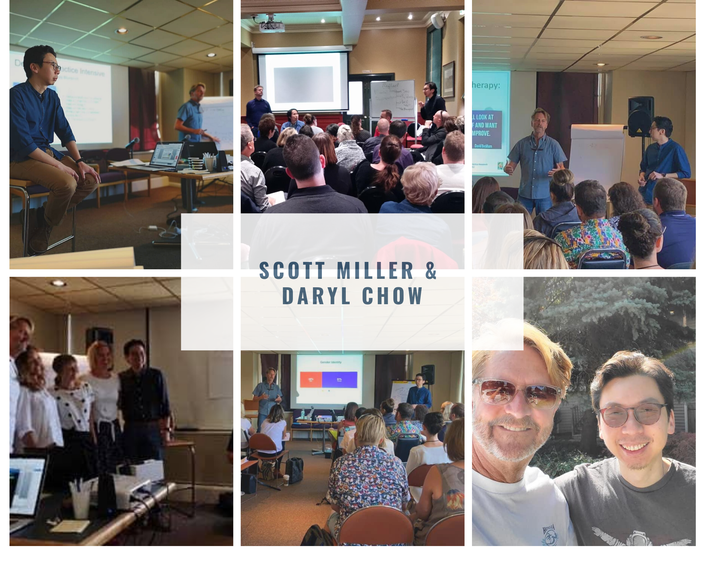MEASURED
Therapists do really want to get better at what they do. Professional development is both a deeply held value and a career long aspiration. It is also central to lifelong job satisfaction. Unfortunately, traditional approaches (e.g.lectures, clinical experience, even supervision) don’t really work; it doesn’t help therapists get any better in their craft.
Gleaning from studies conducted about feedback informed treatment (FIT) and highly effective psychotherapists (Chow 2014, Chow et al. 2015), this course focuses on helping practitioners develop a personalised system to as much as double the effectiveness of treatment while simultaneously reducing costs, drop-out rates and deterioration.
Objectives
At the end of the course, participants will be able to:
- Adopt three systematic steps to improving outcomes of their intervention work.
- Identify cases at risk of dropping out of treatment or experiencing a negative or null outcome.
- Identify and improve areas of weakness in their clinical work.
Target Audience
- Healthcare Professionals, such as counsellors, psychotherapists, psychologists, psychiatrists
The Spine of the Measured Online Course
1. Knowing Your Baseline ("So, how effective am I really?")
2. Formal, Routine, Ongoing Feedback (“How each of my client is doing?”)
3. Foundations for Engaging in Deliberate Practice (“How do I get better?)
The Measured Course Curriculum
Feel free to preview some of the modules made available.
For More on Feedback Informed Treatment (FIT)
Go to the Frontiers of Psychotherapist Development site on FIT
Other Courses by Daryl Chow, MA, Ph.D.
I care alot about how stuff are designed, communicated and taught. Besides, as the legendary coach John Wooden says, "You haven't taught until they have learned."
Here are my other courses.

Frontiers Friday (FF) Newsletter
Before you go, I want to invite you to receive our weekly missive, Frontiers Friday (FF).
Just 5 recommendations each Friday, aimed to help you in your professional development.
Plus, you'd get notified for exclusive discounts to books, courses, and updates on new articles, blogs, etc.
Here are some samples of the FF newsletters:
Caring for People in Organisations (3 Parts)
Clinical Supervision (3 Parts)
Feedback Informed Treatment (4 Parts)
Unintended Consequences (2 Parts)
Deep Learner (4 Parts)
Going Further with Deep Learner and The Use of Obsidian (6 Parts)
Trauma (3 Parts)
Deliberate Practice (5 Parts)
Empathy (6 Parts)
Therapist Effects (2 Parts)
Publications
(This section is more to convince your boss that this course has got some empirical street cred.)
Andrews, W., A. P. Wislocki, F. Short, D. L. Chow, and T. Minami. “A 5-Year Evaluation of the Human Givens Therapy Using a Practice Research Network.” Mental Health Review Journal 18, no. 3 (2013): 165–76. https://doi.org/10.1108/MHRJ-04-2013-0011.
Chow, D. “Changing the Relationship with Your Mental Health Concerns.” In From Hurtful to Helpful: Personal Stories about the Impact of Relationships on Recovery in Mental Health, edited by P. Yap, Z. Goh, C. Wong, and Shawn Ee. Singapore: Candid Creation Publishing LLP, 2015.
Chow, D. (2019) “Deep Learner: A Psychotherapist’s Field Guide to Extend Your Mind and Harness Wisdom into Clinical Practice,” 2019. https://darylchowcourses.teachable.com/p/deeplearner/.
Chow, D. (2018). “Reigniting Clinical Supervision: Taking Clinical Supervisors and Psychotherapists to next Level of Real Development (Web-Based Workshop),” .
Chow D. (2018) The First Kiss: Undoing the Intake Model and Igniting First Sessions in Psychotherapy. Australia: Correlate Press,
Chow, D (2014). “The Study of Supershrinks: Development and Deliberate Practices of Highly Effective Psychotherapists.” Curtin University, 2014. Doctoral Dissertation
Chow, D. L. “The Right to Recovery.” In The Write to Recovery: Personal Stories and Lessons about Recovery from Mental Health Concerns, edited by P. Yap, D. L. Chow, S. Lu, and B. Lee, 1–19. Singapore: Wellspring Catholic Books, 2011.
Chow, D. L., and S. Lu. (2015). “The Use of Routine Outcome Monitoring in an Asian Outpatient Psychiatric Setting.” Presented at the World Federal of Mental Health., Singapore,
Chow, D., S. Lu, S. D. Miller, T. Kwek, A. Jones, and G. Tan. “Improving Therapists’ Ability through Deliberate Practice: The Difficult Conversations in Therapy (DCT) Randomized Clinical Trial. Manuscript in Preparation,”
Chow, D., and S. D. Miller. “Retrospective Analysis of Psychotherapists’ Involvement in Deliberate Practice (RAPIDPractice).” Unpublished manuscript., 2012.
Chow, D., Miller, S. (2022) “Taxonomy of Deliberate Practice Activities Worksheets (Version 6.1).” International Center for Clinical Excellence (ICCE), 2017, 2019 2015.
Chow, D., S. D. Miller, J. A. Seidel, R. T. Kane, J. Thornton, and W. P. Andrews. “The Role of Deliberate Practice in the Development of Highly Effective Psychotherapists.” Psychotherapy 52, no. 3 (2015): 337–45. http://dx.doi.org/10.1037/pst0000015.
Chow, Daryl. “The Practice and the Practical: Pushing Your Clinical Performance to the next Level.” In Feedback-Informed Treatment in Clinical Practice: Reaching for Excellence, edited by David S. Prescott, Cynthia L. Maeschalck, and Scott D. Miller, 323–55. Washington, DC, USA: American Psychological Association, 2017.
Liau, Albert, Daryl Chow, T. K. Tan, and Konrad Senf. “Development and Validation of the Personal Strengths Inventory Using Exploratory and Confirmatory Factor Analyses.” Journal of Psychoeducational Assessment 29, no. 1 (February 1, 2011): 14–26. https://doi.org/10.1177/0734282910365648.
Miller, S. D., S. Bargmann, D. Chow, J. A. Seidel, and C. Maeschalck. “Feedback Informed Treatment (FIT): Improving the Outcome of Psychotherapy One Person at a Time.” In Quality Improvement in Behavioral Health, edited by W. O’Donohue and Alexandros Maragakis, 2014.
Miller, S. D., D. Chow, M. Hubble, B. Wampold, C. Maeschalck, and S. Bargmann. “To Be or Not to Be (an Expert)? Revisiting the Role of Deliberate Practice in Improving Performance.” High Ability Studies, 2018. https://doi.org/10.1080/13598139.2018.1519410.
Miller, S. D., M. A. Hubble, J. A. Seidel, D. Chow, and S. Bargmann. “Feedback Informed Treatment (FIT): Achieving Clinical Excellence One Person at a Time.” Independent Practitioner 34, no. 3 (2014): 78–84.
Miller, S. D., M. Hubble, and D. Chow. Better Results: Using Deliberate Practice to Improve Therapeutic Effectiveness. Washington, DC: American Psychological Association, 2020.
Miller, S.D., Hubble, M, and Chow, D. (2020). Better Results: Using Deliberate Practice to Improve Therapeutic Effectiveness. Washington: American Psychological Association
Miller, S.D., Hubble, M, and Chow, D. (2017).“Professional Development: An Oxymoron?” In The Cycle of Excellence: Using Deliberate Practice in Supervision, Training, and Independent Practice, edited by T. Rousmaniere, R. K. Goodyear, S. D. Miller, and B. Wampold, 23–47. River Street, Hoboken, NJ 07030, USA: Wiley Press
Miller, S.D., Hubble, M, and Chow, D. (2018).. “The Question of Expertise in Psychotherapy.” Journal of Expertise 1, no. 2 (2018).
Miller, Scott D., Susanne Bargmann, Daryl Chow, Jason Seidel, and Cynthia Maeschalck. (2016)“Feedback-Informed Treatment (FIT): Improving the Outcome of Psychotherapy One Person at a Time.” O’Donohue, William [Ed]; Maragakis, Alexandros [Ed] (2016) Quality Improvement in Behavioral Health (Pp 247-262) Ix, 327 Pp Cham, Switzerland: Springer International Publishing; Switzerland, 2016, 247–62.
Miller, Scott D., Daryl Chow, Bruce E. Wampold, Mark A. Hubble, A. C. Del Re, Cynthia Maeschalck, and Susanne Bargmann. “To Be or Not to Be (an Expert)? Revisiting the Role of Deliberate Practice in Improving Performance.” High Ability Studies, 2018, 1–11. https://doi.org/10.1080/13598139.2018.1519410.
Miller, Scott D., Mark A. Hubble, Daryl L. Chow, and Jason A. Seidel. “Beyond Measures and Monitoring: Realizing the Potential of Feedback-Informed Treatment.” Psychotherapy 52, no. 4 (2015): 449–57. http://dx.doi.org/10.1037/pst0000031.
Miller, S.D., Hubble, M.A., Chow, D., and Seidel, J. (2013). “The Outcome of Psychotherapy: Yesterday, Today, and Tomorrow.” Psychotherapy 50, no. 1 : 88–97. https://doi.org/10.1037/a0031097.
Miller, S.D., Hubble, M.A., Chow, D., and Seidel, J. (2014). “The Outcome of Psychotherapy: Yesterday, Today and Tomorrow.” Psychotherapy in Australia. 20, no. 3 (2014): 64–75.
Miller, Scott D., Mark A. Hubble, Daryl Chow, and Jason Seidel. “Beyond Measures and Monitoring: Realizing the Potential of Feedback-Informed Treatment.” Psychotherapy 52, no. 4 (December 2015): 449–57.
Owen, Jesse, Scott D. Miller, Jason Seidel, and Daryl Chow. “The Working Alliance in Treatment of Military Adolescents.” Journal of Consulting and Clinical Psychology 84, no. 3 (2016): 200–210. https://doi.org/10.1037/ccp0000035.
Quirk, K., J. M. Drinane, A. Edelman, D. Chow, J. Lim, D. Chandra, S. Miller, and J. Owen. “The Alliance-Outcome Association in Couple Therapy: A Common Fate Model.” Family Process, May 26, 2021. https://doi.org/10.1111/famp.12666.
Seidel, Jason A., Scott D. Miller, and Daryl L. Chow. “Effect Size Calculations for the Clinician: Methods and Comparability.” Psychotherapy Research, 2013, 1–15. https://doi.org/10.1080/10503307.2013.840812.
Yap, P., D. L. Chow, S. Lu, and B. Lee. The Write to Recovery: Personal Stories and Lessons about Recovery from Mental Health Concerns. Mind This Voice Series. Singapore: Wellspring Catholic Books, 2011.

Skeptical of Online Training?
I know many practitioners are resistant to the idea of online training platforms. I know I was. Even though I would consider myself tech savvy, my experience of several online workshops were frankly, a poor substitute of live workshops. In such situations, live trainings were conducted and recorded, the material was then repurposed and sold for an online course. Other times, it was a recording of a live webinar where the trainer was speaking to a bunch of students, and again, the material was repurposed for an online training, leaving minimal or no possibility of asking questions or interaction with others.
Not all online trainings I've tried were bad though. Through my experimentation and trying to learn from others who were optimising online platforms to increase the depths of learning for individuals, I discovered that it is actually possible to design a learning platform with the primary intention of teaching the material online, without overwhelming an individual, and weaving in time for reflection, discussion, asking questions and applying the new ideas in their lives.
I value real-time face-to-face teaching (after all, I'm one of those who conduct workshops!). However, here's the key difference that I see between real-time training and online learning:
1. Real-time training/workshop is like a river.
It is a constantly flowing torrent of ideas. If the learner steps out of the river for a few minutes, or needs some time to think, he is now behind. The learner may be able to ask questions, but needs to constantly try and catch up and not fall behind. A chance for a revisit of the content after some time of reflection is not possible, with only the notes or slides that you've captured.
2. Online learning, on the other hand, is like a lake.
The learner can step in and out of the water at her own time, and pace herself as she move along; the water reminds the same. This stillness allows for pausing, revisiting the material, reflecting, and connecting with past knowledge. Online learning at its best allows for the learner to ask questions, revisit the materials, and for the person to master a particular difficult segment before moving on.
(note: The analogy of the river vs lake was borrowed from storyteller Matthew Dicks.)
I've had participants of workshops who first attended one of my workshops and who went on to join this in-depth online training. A few pieces of content overlapped, but they said to me, "I didn't realise that I didn't get it as much in the workshop the first time, compared to how I understand the material now from the online module."
Oh, and by the way, you do not need to be tech-savvy at all to navigate this course. If you know how to browse a website (which got you here anyway), chances are it is a non-issue benefiting from this course.
Still unsure? Take this for a test-drive. Preview some of the modules below. We also have a money-back guarantee with the course. This is not meant to be gimmicky. I want you to feel how low the level of "risk" is actually involved.
About Daryl Chow, MA. Ph.D.
Daryl Chow, MA, Ph.D. (Psych), is a practitioner in Australia, and he is a senior associate of the International Center for Clinical Excellence (ICCE). He devotes his time to workshops and researches on the development of expertise and highly effective psychotherapists, teaching practitioners key principles to accelerate learning.
In 2018, his book The First Kiss: Undoing the Intake Model and Igniting First Sessions in Psychotherapy, was described as
"The book I’ve wanted every therapist to read for years." ~ Julie Tilsen, Ph.D.;
"A majestic, digestible, and real approach to psychotherapy..." ~ Jesse Owen, Ph.D., and
"In this engaging book, shows us what we have been doing wrong and more importantly, what we should be doing differently," ~Bruce Wampold, Ph.D.
Together with Scott Miller and Mark Hubble, a much anticipated book, Better Results: Using Deliberate Practice to Improve Therapeutic Effectiveness was released in May, 2020 (American Psychological Association). A follow-up book slated for 2023 is to be released, titled The Field Guide to Better Results.
His other books include The Write to Recovery: Personal Stories & Lessons about Recovery from Mental Health Concerns (available for free), and Creating Impact: the Four Pillars of a Psychological Practice.
Along with K Anders Ericsson, Bruce Wampold and Scott Miller, Daryl was one of the keynote speakers at the Achieving Clinical Excellence (ACE) Conference in Sweden, May 2-4 2018. Watch Daryl's entire presentation about A System of Practice. Click HERE!
Daryl is a published researcher in several peer-reviewed journals. He runs a cutting edge blog for mental health practitioners (Frontiers of Psychotherapist Development), and a meditative blog for the general public, Full Circles: Reflections on Living.
He is currently based in Western Australia, working with a group of vibrant private practitioners at Henry Street Centre, located in Fremantle, WA. He is currently in private practice, providing clinical supervision, training and consultations with a various organisations.
For more information, visit darylchow.com

Based on his doctoral research on the role of deliberate practice in cultivating superior performance in psychotherapy, Daryl and colleagues 2015 peer-reviewed article was nominated the “Most Valuable Paper” by American Psychological Association (APA). His work is featured in two chapters from two edited books in 2017:
1. Cycle of Excellence: Using Deliberate Practice to Improve Supervision and Training (with Scott Miller and Mark Hubble),
2. Feedback-Informed Treatment in Clinical Practice: Reaching for Excellence.
He is the co-author of several articles, chapters and co-editor of, The Write to Recovery: Personal Stories & Lessons About Recovery From Mental Health Concerns, a heart-felt collective of client’s journey of their struggles and recovery process, interweaved with mental health professionals who were part of the healing process.(Click here for to receive the entire ebook for FREE)
Deliberate Practice Research
Daryl is the lead researcher of the Difficult Conversations in Therapy (DCT) clinical trial, helping practitioners like you improve in their therapeutic engagement in challenging scenarios. (The pilot results were brief discussed in this article)






